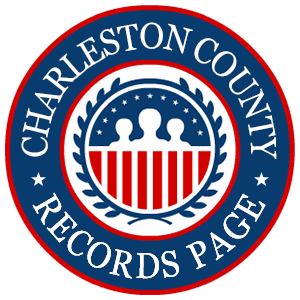Run a free Charleston County warrant search to uncover crucial information on yourself or find wanted persons in the community. Regardless of the reason, the capacity to do this is possible due to the federal Freedom of Information Act (FOIA) and the state’s version of the same law — the South Carolina Freedom of Information Act.
Because of these statutes, county and state agencies are mandated to provide records of wanted persons; they’ll often do this for free or at a nominal cost if copies are requested. This resource provides valuable links to anybody searching for warrant records in Charleston County, South Carolina.
Tracking Down Charleston County Warrant Details for Free (An Overview)
Before searching for information on wanted individuals, citizens must have critical data to accomplish this—the most important of these being the full names of the subject.
Moreover, some agencies will also require the date of birth (DOB) to allow them to search through their databases for wanted individuals. Sometimes, having supplementary information such as physical descriptors, including height, race, and sex, can aid searchers in finding the records they are seeking.
Once patrons have garnered adequate information about the offenders, they may turn to the county agencies who are the custodians of warrant data—the Charleston County Clerk of Court and the Sheriff’s Office.1, 2 It is also possible to obtain warrant records from local city police departments. These agencies allow citizens to access this information electronically, by mail, by phone, or through in-person requests.
The courts generate and issue warrant records, which makes this information part of court documents. As such, they are part of public records mandated by the South Carolina Freedom of Information Act.3 This means anyone can request to view and inspect these records without providing a reason.
Moreover, several types of warrants exist including arrest, bench, child support, and search orders. Nevertheless, some warrants, such as search writs (orders,) are not furnished to the public because revealing this information will obstruct any active investigations by law enforcement. These types of warrants are discussed in depth in the sections that follow.
How To Tell if Someone Is Wanted (Charleston County Warrant Search)
Citizens may need to find warrant records on themselves and other individuals, such as neighbors, to help uphold the community’s safety—they may do so by contacting the Charleston County Clerk of Court and the Sheriff’s Office.4 Both agencies provide patrons with a way to search for warrant data through online portals, electronic record requests and in-person and mail inquiries.
Find Warrant Records via the County Clerk of Court: The Charleston County Clerk of Court maintains records for both the circuit and family courts. The Circuit Courts consist of two courts: the Court of General Sessions, which deals with criminal cases, and the Court of Common Pleas, which handles civil cases.5 Warrants may originate from either court.
The most convenient way to view warrant data would be online through the Charleston County Court Records Search Tool for free.6
This instrument is an index that scours through court records generated by both courts. To find warrants, users can search by last name, court, case type, etc. Patrons can acquire warrant records by clicking on the “Action Type” drop-down menu and selecting any of the options below to find a wanted person.
- Warrant and Affidavit
- Warrant of Distraint
- Warrant of Ejectment
- Warrant Recall
- Warrant Case/Filed
The information displayed on a record includes case number, bonds (if applicable), court agency, and case type.
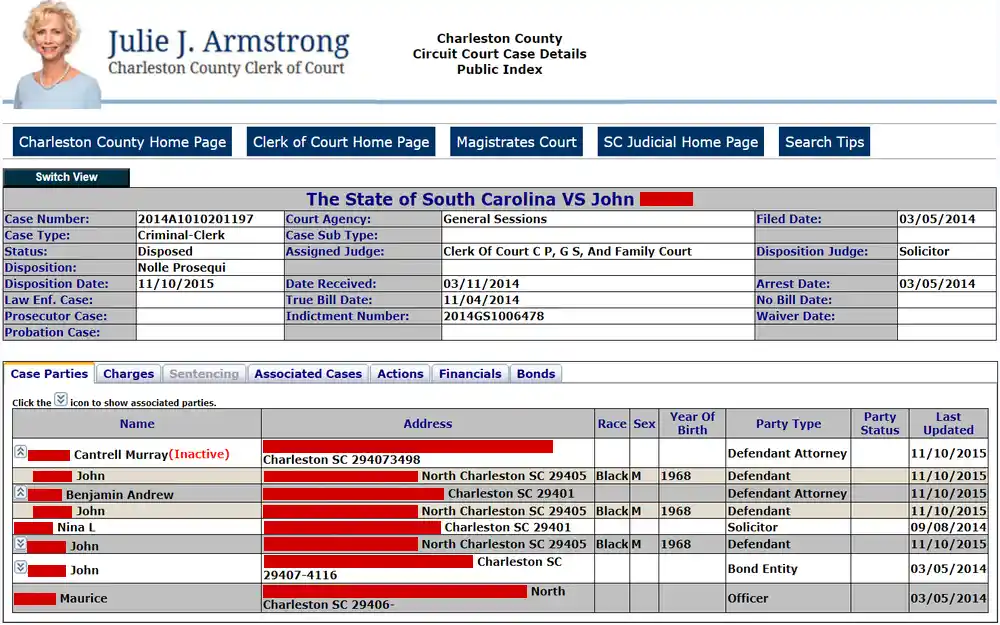
In cases of warrants pertaining to the Family Court, citizens can use an alternative search tool to search for court records.7, 8 Interested persons can find court records using party name, case number and file date.
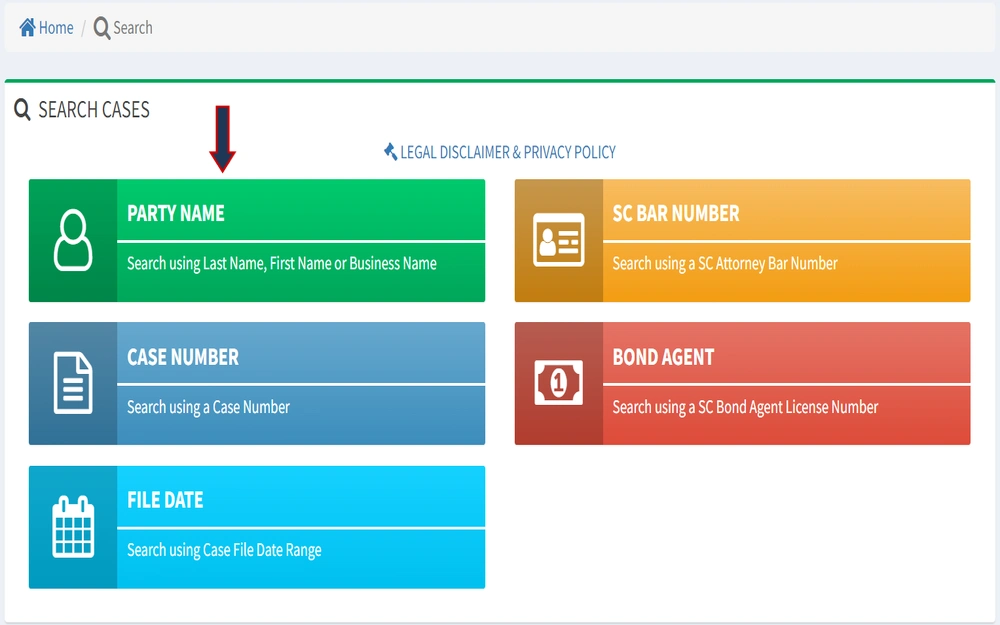
Moreover, patrons can obtain copies of court records, including warrant data, in person or through mail.10 Most cases can be sought online through the aforementioned methods, but sealed documents are not accessible—citizens can only access these by court order. A copy fee of $0.11 applies, which requesters can pay via money order or check payable to the “Charleston County Clerk of Court.”
Make the request in person or by mail to the addresses below.
Clerk of Court – Common Pleas
Suite 106, 100 Broad Street
Charleston, South Carolina 29401
Clerk of Court – General Sessions
Suite 106, 100 Broad Street
Charleston, South Carolina 29401
Clerk of Court – Family Court
Suite 143, 100 Broad Street
Charleston, South Carolina 29401
Acquire Warrant Data Through the Sheriff’s Office: The Charleston County Sheriff’s Office – Warrant Unit maintains a database that contains information on wanted offenders.11 Searchers may access this index online using a free Charleston County Warrants Search Tool.12 Users can find wanted persons using the last, first name or a combination thereof.
Data displayed about the offender include their full names, warrant number, issue date and a description of what they are wanted for.
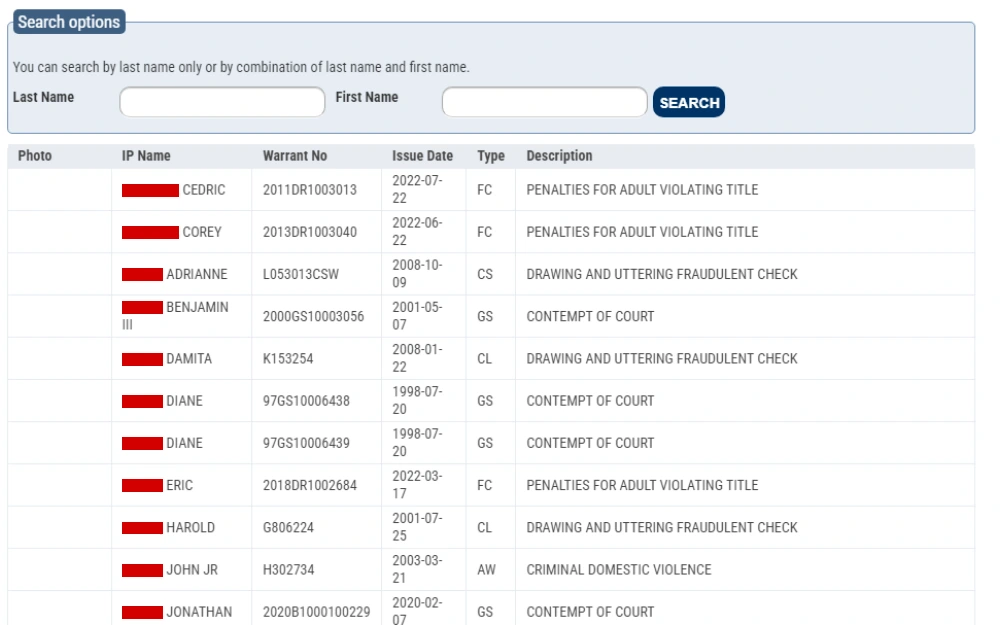
Moreover, citizens have the option to submit anonymous tips as to the whereabouts of wanted persons to the Sheriff’s Office—they may also call the Warrant Division on 843.529.7391 Monday through Friday, 7 AM to 7 PM or 843.202.1700 outside these time frames. Patrons may also email [email protected] for information.
Data in this database may be incorrect or up to date; therefore, the Sheriff’s Office advises contacting the Warrant Unit or visiting the address below to ascertain information. Please note that if the requestor has an active warrant, they may be taken into custody.
Click here for inquiries about warrants or the division.13 Should patrons choose to obtain hard copies, they may retrieve copies from the sheriff’s office.14
Charleston County Sheriff’s Office
Warrants Division
3691 Leeds Avenue
North Charleston, South Carolina 29405
Retrieve Warrant Information From Municipal Agencies: Interested parties can seek information on wanted persons from local public agencies such as city police departments. The three most populated cities in Charleston County are Mount Pleasant, Hollywood and Isle of Palms.
The Isle of Palms Police Department gives citizens an opportunity to request public records pursuant to the South Carolina Freedom of Information Act at no cost in most cases.15, 16
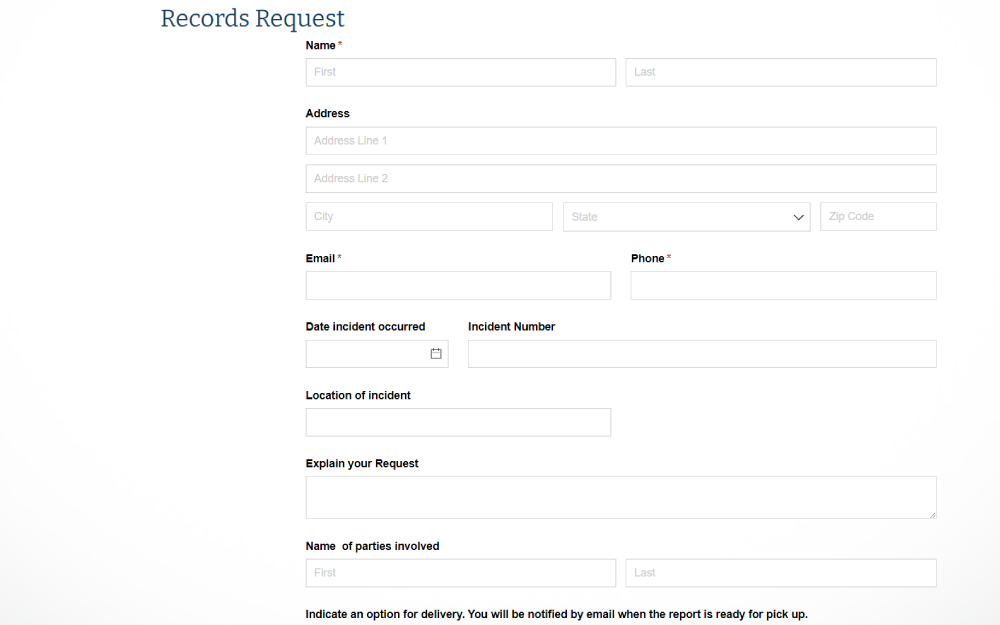
Black and white copies cost $0.1 per page, and color copies $0.2 per page.
Interested parties can request these records electronically or email [email protected]. They may also call in or fax their request to 843.886.6522 or 843.886.8527. Requesters may pick up documents, or the police department may fax or mail them. The police department honors requests in 10 working days.
Isle of Palms Police Department
30 J. C. Long Boulevard
Isle of Palms, South Carolina 2945
Types of Warrants & What Each Signifies
Warrants differ in Charleston County depending on why they are issued, such as cases of misdemeanors or failure to appear for scheduled court hearings—examples of writs are arrest, bench, probation, and traffic. A warrant is an order issued by the courts against citizens authorizing law enforcement to take them into custody or search a premises.17
Judges only issue warrants if there is a probable cause of a crime documented and presented by law enforcement officials justifying an arrest or search.18 They are permitted due to the Fourth Amendment of the U.S. Constitution since they explicitly violate the freedoms of persons and property.19
The most common forms of writs in Charleston County are search, arrest and bench warrants.20 Arrest warrants are issued for misdemeanors, although in some cases, they may be for felonies.
However, in the latter case, there is usually enough probable cause not to require the issue of a warrant. Arrest warrants provide authority to law enforcement agencies to take persons into custody for crimes they have allegedly committed.
Bench warrants are a form of arrest writ that judges issue to citizens who have failed to appear for a mandatory court appearance. Conversely, when defendants do not fulfill their obligations of appearing for a scheduled court hearing before a plea has been entered or do not respond to a citation, the courts will issue alias warrants.
Search warrants permit the police to search persons, homes and their property. These types of warrants also allow law enforcement officials to seize items that may be significant to an investigation.
Traffic warrants are issued for unpaid fines for traffic violations to bring the defendants to pay for them.21
Judges issue capias warrants when defendants fail to pay for fines after having pleaded guilty or found guilty through court appearance. Civil capias warrants, while having a similar term to capias orders, are issued against defendants who repeatedly do not comply with a judge’s orders.
Fugitive warrants are issued out of state when a suspect is in Charleston County, while Governor’s writs allow for the extradition for a defendant to the state where they have allegedly committed a crime. The Charleston County Sheriff’s Office has a Fugitive & Extradition Unit that handles these warrants.22
Probation and parole warrants permit the arresting of offenders, including felons currently released into the community under supervision. This occurs when they have violated their probation and parole terms.
Lastly, the courts may sometimes issue child support warrants to parents who have failed in their maintenance payments.
How To Clear Warrants in Charleston County SC by Getting Them Dropped or Resolved
While a warrant does not imply guilt, it should be addressed and resolved as soon as possible to avoid unnecessary arrest and embarrassment—this can be accomplished through several ways including, paying fines or rescheduling court appearances.
As mandated by Section 23-15-50 of the Code of Laws of SC, the Sheriff’s Office is obligated to arrest individuals against whom warrants have been issued.23 Once a person finds and confirms a warrant, whether for themselves or others, they should consider legal help.
If a patron finds warrant information for someone else, such as a friend or family, they should immediately notify them. Sometimes, citizens may stumble upon wanted persons who are part of their community.
It is best to inform law enforcement to safeguard the community’s safety; the Charleston County Sheriff’s Office provides a way for citizens to inform them of wanted persons anonymously; citizens may also call the Warrant Division on 843.529.7391 on weekdays from 7 AM to 7 PM or 843.202.1700 at any other time. Moreover, patrons may submit a tip for wanted persons or report suspicious activity through the South Carolina State Law Enforcement Division.24
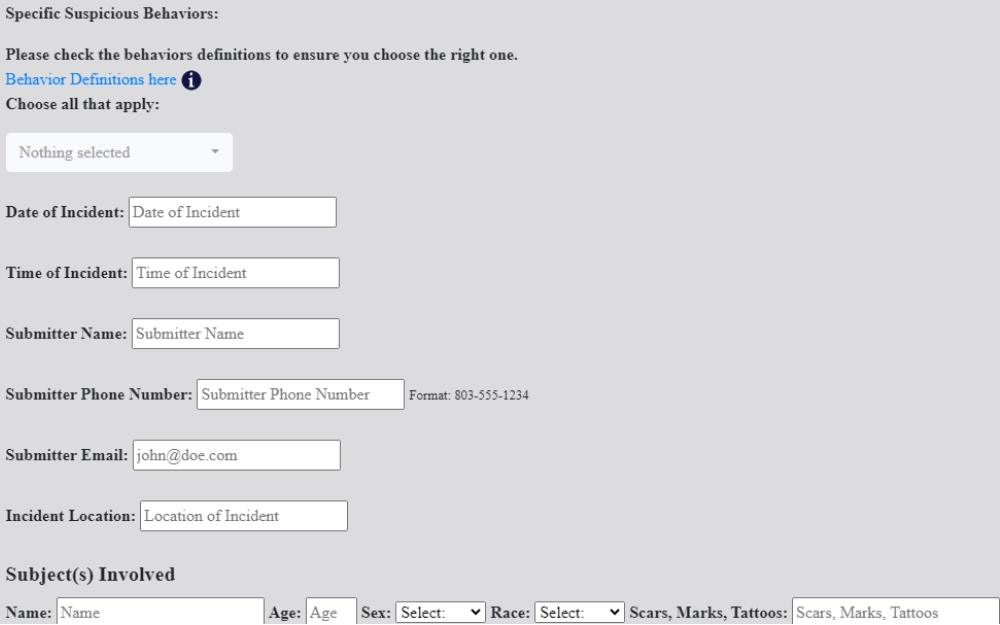
To quash a warrant, defendants have several options at their disposal. The Charleston County Sheriff’s Office advises citizens who are wanted to call the Warrants Office and make an appointment with a deputy at the bond court. Upon fulfilling this, the warrant will be served and a bond hearing set.
For the most part, individuals who turn themselves in will be issued a Personal Recognizance (P.R.) and will not have to go to jail. They will receive a court date, and the Sheriff’s Office will photograph and fingerprint the defendant, and they will be free to leave.
Individuals with more serious crimes can still turn themselves in by calling the numbers above or at the Detention Center or Sheriff’s Headquarters, whose addresses are below.25 Before doing this, It is advisable to contact an attorney, let family members know and obtain the services of a bondsman if a bond decision is likely.
Sheriff Al Cannon Detention Center
3841 Leeds Avenue
North Charleston, South Carolina 29405
Phone: 843.529.7300 or 843.202.1700
Charleston County Sheriff’s Office
3691 Leeds Avenue
North Charleston, South Carolina 29405
Phone: 843.202.1700
Paying fines and amounts due will also resolve warrants, as will scheduling new court dates to appear before a judge for missed hearings that triggered the warrant.
A Charleston County warrant search makes it possible for citizens to ascertain if they or someone else has an active writ; this article outlines helpful information to aid patrons in acquiring the information they need.
Check out the tutorial for finding anyone wanted in South Carolina to view statewide warrants, or the Charleston County public information lookup steps to access local records of court proceedings, arrests, inmates, crimes, and more.
References
1Charleston County Clerk of Court. (n.d.). General information. Retrieved January 13, 2024, from <https://www.charlestoncounty.org/departments/clerk-of-court/general-information.php#go>
2Charleston County Sheriff’s Office. (n.d.). Contact. Retrieved January 13, 2024, from <https://sheriff.charlestoncounty.org/contact.php>
3South Carolina State House. (n.d.). Title 30 – Public records, chapter 4 – Freedom of Information Act. Retrieved January 13, 2024, from <https://www.scstatehouse.gov/code/t30c004.php>
4Charleston County Sheriff’s Office. (n.d.). Home page. Retrieved January 13, 2024, from <https://sheriff.charlestoncounty.org/index.php>
5Charleston County Clerk of Court. (n.d.). Circuit Court. Retrieved January 13, 2024, from <https://www.charlestoncounty.org/departments/clerk-of-court/circuit-court.php#go>
6Charleston County Clerk of Court. (n.d.). Public index. Retrieved January 13, 2024, from <https://jcmsweb.charlestoncounty.org/PublicIndex/?AspxAutoDetectCookieSupport=1>
7Charleston County Clerk of Court. (n.d.). Family Court. Retrieved January 13, 2024, from <https://www.charlestoncounty.org/departments/clerk-of-court/family-court.php#go>
8CourtPlus. (n.d.). Home page. Retrieved January 13, 2024, from <https://www.courtplus.org/>
9CourtPlus. (n.d.). Search. Retrieved January 13, 2024, from <https://www.courtplus.org/search>
10Charleston County Clerk of Court. (n.d.). FAQs. Retrieved January 13, 2024, from <https://www.charlestoncounty.org/departments/clerk-of-court/faqs.php>
11Charleston County Sheriff’s Office. (n.d.). Warrants. Retrieved January 13, 2024, from <https://sheriff.charlestoncounty.org/warrants.php>
12Charleston County Sheriff’s Office. (n.d.). Warrants search. Retrieved January 13, 2024, from <https://sheriff.charlestoncounty.org/warrants-search.php>
13Charleston County Sheriff’s Office. (n.d.). Special operations – Warrants. Retrieved January 13, 2024, from <https://sheriff.charlestoncounty.org/special-operations.php#warrants>
14Charleston County Sheriff’s Office. (n.d.). Administrative services – Records. Retrieved January 13, 2024, from <https://sheriff.charlestoncounty.org/admin-services.php#records>
15City of Isle of Palms Police Department. (n.d.). Police. Retrieved January 13, 2024, from <https://www.iop.net/police>
16City of Isle of Palms Police Department. (n.d.). Request records. Retrieved January 13, 2024, from <https://www.iop.net/police/request-records>
17Legal Information Institute, Cornell Law School. (n.d.). Warrant. Retrieved January 13, 2024, from <https://www.law.cornell.edu/wex/warrant>
18National Archives. (n.d.). The Fourth Amendment. Retrieved January 13, 2024, from <https://constitution.congress.gov/browse/essay/amdt4-5-3/ALDE_00000787/>
19National Archives. (n.d.). The Constitution of the United States: Amendment 4. Retrieved January 13, 2024, from <https://constitution.congress.gov/constitution/amendment-4/>
20South Carolina Judicial Branch. (n.d.). Summary Court Judges Bench Book – Criminal Cases. Retrieved January 13, 2024, from <https://www.sccourts.org/summaryCourtBenchBook/displaychapter.cfm?chapter=CriminalC>
21South Carolina State House. (n.d.). Title 56 – Motor vehicles, chapter 7 – Traffic tickets. Retrieved January 13, 2024, from <https://www.scstatehouse.gov/code/t56c007.php#56-7-10>
22Charleston County Sheriff’s Office. (n.d.). Fugitive and extradition. Retrieved January 13, 2024, from <https://sheriff.charlestoncounty.org/fugitive-extradition.php>
23South Carolina State House. (n.d.). Title 23 – Law enforcement and public safety. Retrieved January 13, 2024, from <https://www.scstatehouse.gov/code/t23c015.php>
24South Carolina Law Enforcement Division. (n.d.). Sex offender registry form. Retrieved January 13, 2024, from <https://www.sled.sc.gov/SAR_Form>
25Charleston County Sheriff’s Office. (n.d.). Detention. Retrieved January 13, 2024, from <https://sheriff.charlestoncounty.org/detention.php>
